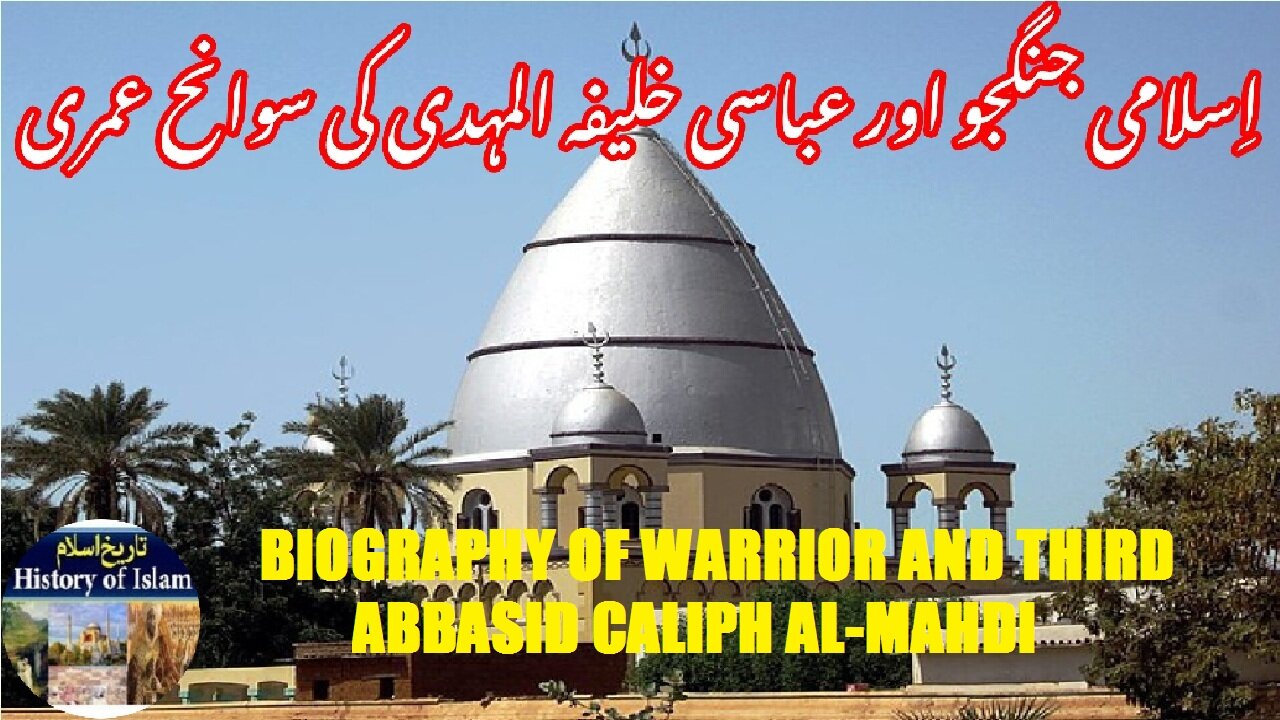Premium Only Content

Biography of Warrior Al-Mahdi | جنگجو اور تیسرے عباسی خلیفہ المہدی کی سوانح عمری
@islamichistory813 #WarriorCaliph #AbbasidDynasty #HistoricalBiography #CaliphAlMahdi
Biography of Warrior and third Abbasid Caliph Al-Mahdi
Dekhti Aankhooon aur sountay kaanoon ko Asslamoalaikum, sisters, brothers friends and elders,In this Islamic informative video, we are presenting the biography of Al-Mahdi, the third caliph of the Abbasid dynasty, celebrated for his strategic military leadership and governance. Watch complete video and get to know the pivotal moments of his reign, his efforts in expanding the empire, and how he shaped the cultural and political landscape of his time. Gain insights into the life of this influential figure in Islamic history.
Abu Abd Allah Muhammad ibn Abd Allah al-Mahdi better known by his regnal name al-Mahdi was the third Abbasid Caliph who reigned from 775 to his death in 785. He succeeded his father, al-Mansur.
Al-Mahdi was born in 744 or 745 AD in the village of Humeima (modern-day Jordan). His mother was called Arwa, and his father was al-Mansur. When al-Mahdi was ten years old, his father became the second Abbasid Caliph. When al-Mahdi was young, his father needed to establish al-Mahdi as a powerful figure in his own right. So, on the east bank of the Tigris, al-Mansur oversaw the construction of East Baghdad, with a mosque and royal palace at its heart. Construction in the area was also heavily financed by the Barmakids, and the area became known as Rusafa.
According to reports, he was tall, charming, and stylish; he had tan skin, a long forehead, and wavy hair. He loved women.
When he was 15 years old, al-Mahdi was sent to defeat the uprising of Abdur Rahman bin Abdul Jabbar Azdi in Khorasan. He also defeated the uprisings of Ispahbud, the governor of Tabaristan, and Astazsis,[verification needed] massacring more than 70,000 of his followers in Khorasan. These campaigns put Tabaristan, which was only nominally within the caliphate, firmly under Abbasid control.In 762 AD, al-Mahdi was the governor of the Abbasid Caliphate's eastern region, based in Ray. It was here that he fell in love with al-Khayzuran (translates as "bamboo"), a daughter of a warlord in Herat and had several children, including the fourth and fifth future Caliphs, al-Hadi and Harun al-Rashid. Around 770 AD (153 AH), al-Mahdi was appointed as Amir al-hajj. Al-Khayzuran was gifted to Mahdi by his father.
Al-Mahdi's father, al-Mansur, died on the hajj to Mecca in 775. The throne then passed to al-Mansur's chosen successor, his son al-Mahdi. According to Marozzi, "[it] was, by the standards of the future, blood-soaked successions of the Abbasid caliphate, a model of order and decorum."
Al-Mahdi, whose nickname means "Rightly-guided" or "Redeemer", was proclaimed caliph when his father was on his deathbed. His peaceful reign continued the policies of his predecessors.
Mahdi commenced his rule by releasing several political prisoners, expanding and decorating the holy places of Mecca and Medina, and building fountains and lofts for Hajj pilgrims. He expanded the mail service, increased his secret service, fortified cities, and increased judicial appointments. His charitable giving was also impressive.
Rapprochement with the Alids in the Caliphate occurred under al-Mahdi's reign. The Barmakid family, which had advised the Caliphs since the days of Abu al-‘Abb?s as viziers, gained even greater powers under al-Mahdi's rule, and worked closely with the caliph to ensure the prosperity of the Abbasid state.
Al-Mahdi reigned for ten years. He imprisoned his most trusted vizier Ya'qub ibn Dawud. In the year 167 AH/ 783 AD, al-Mahdi instituted an official inquisition which led to the execution of alleged Zindiq (heretics). He was fond of music and poetry and during his caliphate many musicians and poets received his patronage and he supported musical expression and poetry across his dominion; accordingly, his son Ibrahim ibn al-Mahdi (779–839) and his daughter ‘Ulayya bint al-Mahd? (777-825) were both noted poets and musicians.
In 775, a Byzantine envoy, Tarath, travelled to Baghdad to convey the congratulations of the Byzantine emperor to al-Mahdi on his accession to the throne. Tarath was so pleased with the hospitality he received that he offered to put his engineering knowledge to use and build a mill that would generate annual profits, of 500,000 dirhams, equal to the cost of its construction. On completion, the envoy's forecast proved to be correct, and so, delighted, al-Mahdi ordered that all profits should be given to the envoy, even after he left Baghdad. It is believed this continued to his death, in 780.
In 775, Al-Fadl ibn Salih was appointed governor of the region of al-Jazira north of Damascus by the caliph al-Mahdi. He moved to al-Jazira the same year. Al-Fadl returned to Damascus following his trip to Jerusalem in 780 where he accompanied al-Mahdi as part of his entourage.
Tomorow we will be described Fight with byzantines and story of death of Caliph Al-Mahdi. So permission us upto tomorow. Allah Hafiz
=======================================
-
 17:13
17:13
ISLAMIC HISTORY
4 hours agoRabi-ul-Awwal Special Biography of Prophet Muhammad (PBUH) Part-1 سیرت نبوی صلی اللہ علیہ وسلم
1 -

Redacted News
1 hour agoEMERGENCY! BILL GATES CULT MEMBERS FOUND PLANTED INSIDE MULTIPLE FEDERAL AGENCIES, RFK FURIOUS
91K42 -
 31:02
31:02
Kimberly Guilfoyle
2 hours agoFull Breaking News Coverage: Live with John Nantz & Steve Moore | Ep250
11.4K4 -
 1:15:19
1:15:19
vivafrei
3 hours agoShameless Politicization of Tragedy! Susan Monarez is OUT! Pritzker is an IDIOT! & MORE!
98.6K37 -
 LIVE
LIVE
LFA TV
10 hours agoLFA TV ALL DAY STREAM - THURSDAY 8/28/25
1,406 watching -
 LIVE
LIVE
freecastle
3 hours agoTAKE UP YOUR CROSS- CREATED IN HIS IMAGE
140 watching -
 1:49:30
1:49:30
The Quartering
4 hours agoCount Dankula Live On Migrant Crisis In Europe, Whiteness & More
121K156 -
 3:46:59
3:46:59
Barry Cunningham
8 hours agoBREAKING NEWS: KAROLINE LEAVITT HOLDS WHITE HOUSE PRESS CONFERENCE (AND MORE NEWS)
72K51 -
 47:21
47:21
Stephen Gardner
21 hours ago🔥Elon Just Exposed the Most Corrupt Man on Earth - Trump Makes BOLD MOVE!
21K106 -
 56:48
56:48
The HotSeat
2 hours agoI'm NOT Sorry! Guns Aren’t the Problem—Godless Culture Is
17.2K15